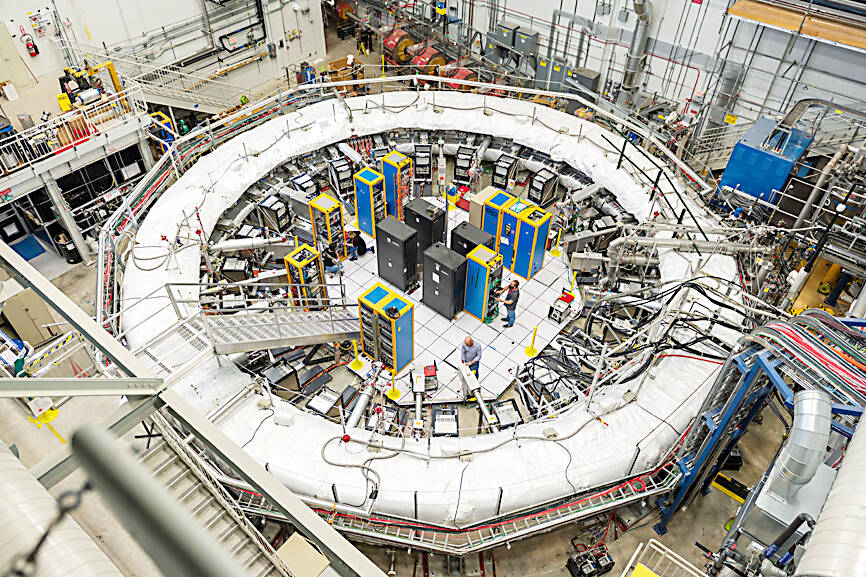The peculiar wobble of a subatomic particle called a muon in a US laboratory experiment is making scientists increasingly suspect they are missing something in their understanding of physics — perhaps some unknown particle or force.
Researchers on Thursday announced new findings about the muon, a magnetic and negatively charged particle similar to its cousin the electron, but 200 times more massive, in their experiment at the US Department of Energy’s Fermi National Accelerator Laboratory in Batavia, Illinois.
The experiment studied the wobble of muons as they traveled through a magnetic field. The muon, like the electron, has a tiny internal magnet that causes it to wobble — or, technically speaking, “precess” — like the axis of a spinning top while in a magnetic field, but the wobble’s speed, as measured in the experiment, varied considerably from what was predicted based on the Standard Model of particle physics, the theory that explains how the basic building blocks of matter interact, governed by four fundamental forces in the universe.

Photo: Reuters
The new findings, building on data released in 2021, continue to hint at some mysterious factor at play as the researchers try to sort out the discrepancy between the theoretical prediction and the actual experimental results.
“We are looking for an indication that the muon is interacting with something that we do not know about. It could be anything: new particles, new forces, new dimensions, new features of space-time, anything,” said Brendan Casey, a senior scientist at Fermilab and one of the authors of a research paper on the findings published in the journal Physical Review Letters.
“Yes, it is fair to say that it could be pointing to unknown particles or forces,” University College London physicist and study coauthor Rebecca Chislett said. “Currently due to new results in the theory community, it is difficult to say exactly what the discrepancy between the two [predicted muon behavior and observed behavior] is, but theorists are working hard to resolve this.”
The experiment was conducted at minus-268°C. The researchers shot beams of muons into a doughnut-shaped superconducting magnetic storage ring 15m in diameter. As the muons zipped around the ring traveling nearly at the speed of light, they interacted with other subatomic particles that, like tiny dance partners, altered their wobble.
The 2021 results similarly showed an anomalous wobble. The new results were based on quadruple the amount of data, bolstering confidence in the findings.
“With all this new knowledge, the result still agrees with the previous results and this is hugely exciting,” Chislett said.
The researchers hope to announce their final findings using all of their collected data in about two years.

OPTIMISTIC: A Philippine Air Force spokeswoman said the military believed the crew were safe and were hopeful that they and the jet would be recovered A Philippine Air Force FA-50 jet and its two-person crew are missing after flying in support of ground forces fighting communist rebels in the southern Mindanao region, a military official said yesterday. Philippine Air Force spokeswoman Colonel Consuelo Castillo said the jet was flying “over land” on the way to its target area when it went missing during a “tactical night operation in support of our ground troops.” While she declined to provide mission specifics, Philippine Army spokesman Colonel Louie Dema-ala confirmed that the missing FA-50 was part of a squadron sent “to provide air support” to troops fighting communist rebels in

PROBE: Last week, Romanian prosecutors launched a criminal investigation against presidential candidate Calin Georgescu accusing him of supporting fascist groups Tens of thousands of protesters gathered in Romania’s capital on Saturday in the latest anti-government demonstration by far-right groups after a top court canceled a presidential election in the EU country last year. Protesters converged in front of the government building in Bucharest, waving Romania’s tricolor flags and chanting slogans such as “down with the government” and “thieves.” Many expressed support for Calin Georgescu, who emerged as the frontrunner in December’s canceled election, and demanded they be resumed from the second round. George Simion, the leader of the far-right Alliance for the Unity of Romanians (AUR), which organized the protest,

ECONOMIC DISTORTION? The US commerce secretary’s remarks echoed Elon Musk’s arguments that spending by the government does not create value for the economy US Secretary of Commerce Howard Lutnick on Sunday said that government spending could be separated from GDP reports, in response to questions about whether the spending cuts pushed by Elon Musk’s Department of Government Efficiency could possibly cause an economic downturn. “You know that governments historically have messed with GDP,” Lutnick said on Fox News Channel’s Sunday Morning Futures. “They count government spending as part of GDP. So I’m going to separate those two and make it transparent.” Doing so could potentially complicate or distort a fundamental measure of the US economy’s health. Government spending is traditionally included in the GDP because

Hundreds of people in rainbow colors gathered on Saturday in South Africa’s tourist magnet Cape Town to honor the world’s first openly gay imam, who was killed last month. Muhsin Hendricks, who ran a mosque for marginalized Muslims, was shot dead last month near the southern city of Gqeberha. “I was heartbroken. I think it’s sad especially how far we’ve come, considering how progressive South Africa has been,” attendee Keisha Jensen said. Led by motorcycle riders, the mostly young crowd walked through the streets of the coastal city, some waving placards emblazoned with Hendricks’s image and reading: “#JUSTICEFORMUHSIN.” No arrest